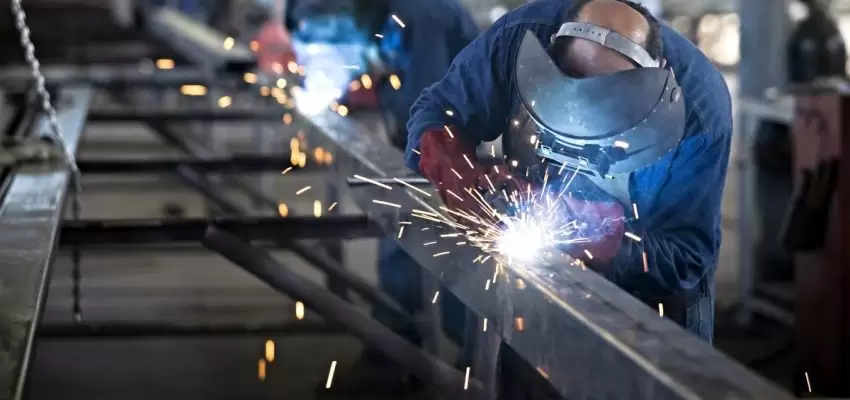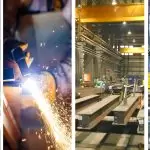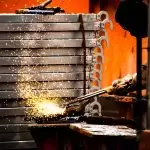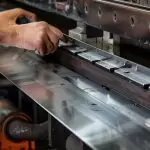Making the proper choice when choosing a steel fabricator is essential and can have a big impact on how well your building project turns out. It might be a daunting procedure to choose among so many possibilities. Focusing on a few key factors can help streamline your decision and ensure you find the best partner for the job. This article will go over the most important factors to look for when screening possible steel fabricators to find the best fit for your particular requirements.
Post your Requirement
Let’s first define a few fundamental terms:
| Term | Definition |
| Steel Fabricator |
A professional or a company specializing in the fabrication of steel structures or components. This involves cutting, shaping, and assembling raw steel materials into the desired form according to specific designs. |
| Stainless Steel Fabricator |
Similar to a steel fabricator but specifically focuses on working with stainless steel. Stainless steel fabricators have expertise in handling and manipulating this corrosion-resistant alloy to create various products. |
| Steel Fabricators in India |
Companies or individuals in India engaged in steel fabrication services. They offer a wide range of services such as custom fabrication, structural steelwork, machining, welding, and finishing for various applications. |
Let us now go through the factors to be considered while choosing the right steel fabricator for your dream project
-
Reputation & Experience:
- One of the first factors to evaluate is a steel fabricator’s reputation and years in business.
- An established company with a proven track record of success has demonstrated the ability to deliver quality workmanship and meet customer expectations across a variety of projects.
- Ask the fabricator about their experience with jobs of similar size, scope, and complexity to yours.
- Request references from previous clients and inspect some of their past work. An experienced fabricator with a solid reputation provides added confidence that they can handle your project requirements.
- Evaluate their expertise across different materials, buildings, and design elements to ensure your specific job aligns with their capabilities. A custom home project requires different skills than an industrial warehouse or high-rise, so choose a fabricator with expertise in your vertical.
-
Quality Control & Certifications:
- In conjunction with reputation, assess the fabricator’s commitment to quality control and any industry certifications held.
- Rigorous quality assurance standards and procedures, like ISO 9001 certification, indicate sophistication and consistency in their workmanship.
- Ask about their inspection process and equipment used to test structural integrity and precision measurements.
- Additionally, certified welders should perform all welding applications based on specific codes and standards to provide finished assemblies optimized for durability.
- Review which governing body certifications the shop and its team members currently hold.
- Reputable trade organizations include the American Institute of Steel Construction (AISC), Associated Builders and Contractors (ABC), and the American Welding Society (AWS).
- Certifications verify expertise and capabilities that translate to superior project delivery for customers.
-
Services & Capabilities:
- Carefully examine what services and capabilities the steel fabricator can provide in-house versus outsourcing to partners.
- Assessing their vertical integration across the supply chain provides insight into efficiency and control over quality.
- Can they handle everything from initial design and engineering through fabrication, surface finishing, inspection, and final delivery/installation? Or is your project dependent on a disjointed web of external suppliers?
- Look for advanced equipment and technology, like CNC machining and automated welding robots, to enable faster, more precise fabrication.
- A one-stop provider that handles the entire process from start to finish offers convenience and accountability.
-
Project Management:
- An indicator of customer service quality includes the fabricator’s project management capabilities. Who oversees the initiation, planning, execution, performance/analysis, and closure of your job?
- Is there a single, knowledgeable point of contact or do you get handed off between multiple team members?
- Define the roles and responsibilities of each team player that touches your project.
- Assess their technical competencies, communication skills, and problem-resolution strategies.
- Clear deliverables, timelines, and accountability through each phase lead to a positive customer experience.
- Streamlined issue escalation protocols ensure no delays if anything falls through the cracks.
-
Location & Logistics:
- From a cost and timing perspective, the proximity of the steel fabricator’s facility to your project site is key.
- Can they mobilize quickly for any necessary site visits during the initial design?
- How accessible are they if you need to personally inspect work-in-progress stages onsite?
- Do they have the available capacity and bandwidth to start your job on schedule?
- Once fabricated, can finished components be easily transported based on part sizes, road restrictions, etc?
- Compare distance and logistics across shortlisted providers to determine the most efficient. Local or regional shops help accelerate timelines and coordination. Additionally, geographic proximity promotes better communication and visibility.
-
Pricing & Proposals:
While intrusive to only focus on bottom-line pricing, the total cost across the production cycle is vital for budget-conscious projects. Obtain detailed quotes from at least three fabricators, ensuring you provide identical specifications to each. Then do an apples-to-apples comparison of costs at each work stage – engineering, materials, fabrication/finishing labor, inspection/testing, transport, and installation. Guaranteed not to exceed or firm fixed pricing provides cost control. Also, assess how change requests get handled if you need to modify the scope mid-stream. The goal is to secure the highest quality workmanship your budget allows, striking the right balance between cost and capabilities.
Conclusion
Selecting the right steel fabricator for your next construction endeavor requires careful due diligence across several considerations – experience, quality control, services, project management, location, and pricing. Weigh each of these decision factors based on the unique requirements of your project to make the best match. Partnering with a trusted industry expert provides the reassurance and peace of mind needed to execute a seamless, successful project. Leverage the criteria above during your vetting process to find the right fit.























Post A Comment